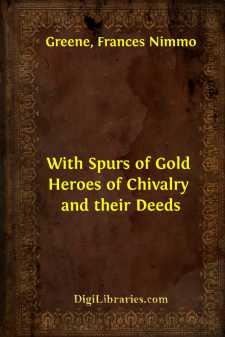Categories
- Antiques & Collectibles 13
- Architecture 36
- Art 48
- Bibles 22
- Biography & Autobiography 813
- Body, Mind & Spirit 142
- Business & Economics 28
- Children's Books 14
- Children's Fiction 11
- Computers 4
- Cooking 94
- Crafts & Hobbies 4
- Drama 346
- Education 46
- Family & Relationships 57
- Fiction 11828
- Games 19
- Gardening 17
- Health & Fitness 34
- History 1377
- House & Home 1
- Humor 147
- Juvenile Fiction 1873
- Juvenile Nonfiction 202
- Language Arts & Disciplines 88
- Law 16
- Literary Collections 686
- Literary Criticism 179
- Mathematics 13
- Medical 41
- Music 40
- Nature 179
- Non-Classifiable 1768
- Performing Arts 7
- Periodicals 1453
- Philosophy 64
- Photography 2
- Poetry 896
- Political Science 203
- Psychology 42
- Reference 154
- Religion 513
- Science 126
- Self-Help 84
- Social Science 81
- Sports & Recreation 34
- Study Aids 3
- Technology & Engineering 59
- Transportation 23
- Travel 463
- True Crime 29
With Spurs of Gold Heroes of Chivalry and their Deeds
Categories:
Description:
Excerpt
THE MOORS IN SPAIN
In the seventh century an Arab by the name of Mohammed, or Mahomet, established a new religion in the East. This religion was called Islam, meaning The Faith, and its followers were known as Mohammedans, Mussulmans, or Moslems. The principal article of their belief is expressed in the formula, "There is no God but Allah, and Mohammed is his prophet."
The new faith spread rapidly, and Mohammed soon became the ruler of all the people who received him as a prophet. His successors, called Caliphs, or Khalifs, conquered Palestine, Syria, Persia, and northern Africa. The inhabitants of the countries thus added to the Mohammedan empire usually adopted the faith of their conquerors, and undertook to carry it into other lands.
In 711 A. D., a body of these Mohammedans, under the leadership of Tarik, crossed the strait between Africa and Spain and landed at the place since known as Gibraltar (Jebel-el-Tarik, or The Rock of Tarik). The invaders were met near Xeres by the Christians, under the command of Roderick, King of the Visigoths, and the fierce battle of Jerez de La Frontera, or Guadalete, took place. At the end of three days' fighting, Roderick was slain, and the Christians were completely routed. Victory after victory for Tarik followed, and in three short years all Spain, except the extreme northern part, was in the hands of the invaders.
These victorious followers of Mohammed, though people of various nationalities, were all designated by the Spaniards Moors, from the name of a tribe that came from Morocco, or Saracens, from an Arabic word meaning eastern. Often they were called simply infidels, meaning unbelievers.
The Moors were not only skilled warriors, but a people of much intelligence, and made far more rapid advances in civilization than the Spaniards. They fostered education, and founded schools and libraries. They possessed a considerable knowledge of astronomy, algebra, chemistry, and natural history, and attained great excellence in the arts of music, poetry, and architecture. They built splendid cities, adorned with magnificent mosques and palaces. The wonderful mosque of Cordova and the beautiful Alhambra at Granada remain to this day as monuments of the Moorish skill in architecture.
Nor were the Moors cruel or tyrannical rulers. It was not often that a Moorish emir or king ill-treated or persecuted his Christian subjects. As a rule, the Christians were allowed more privileges and greater freedom than was usually accorded to a conquered people in those days. But the Spaniards were proud and intensely religious, and they bitterly resented their state of subjection to a foreign and "infidel" people. Again and again they attempted to overthrow the power of the Moors and to drive them from Spain. For more than seven hundred years, war was waged at intervals between the conquerors and the conquered. There could be no permanent peace between Mohammedans and Christians, for each people despised the religion of the other, and each was determined to rule in Spain....


